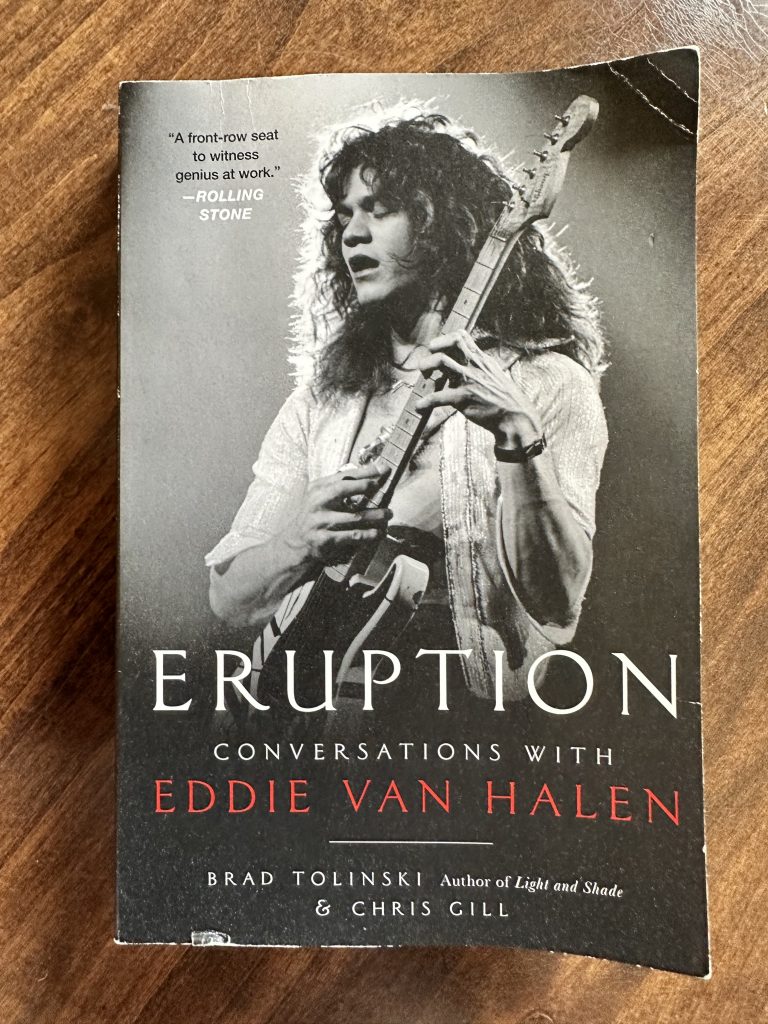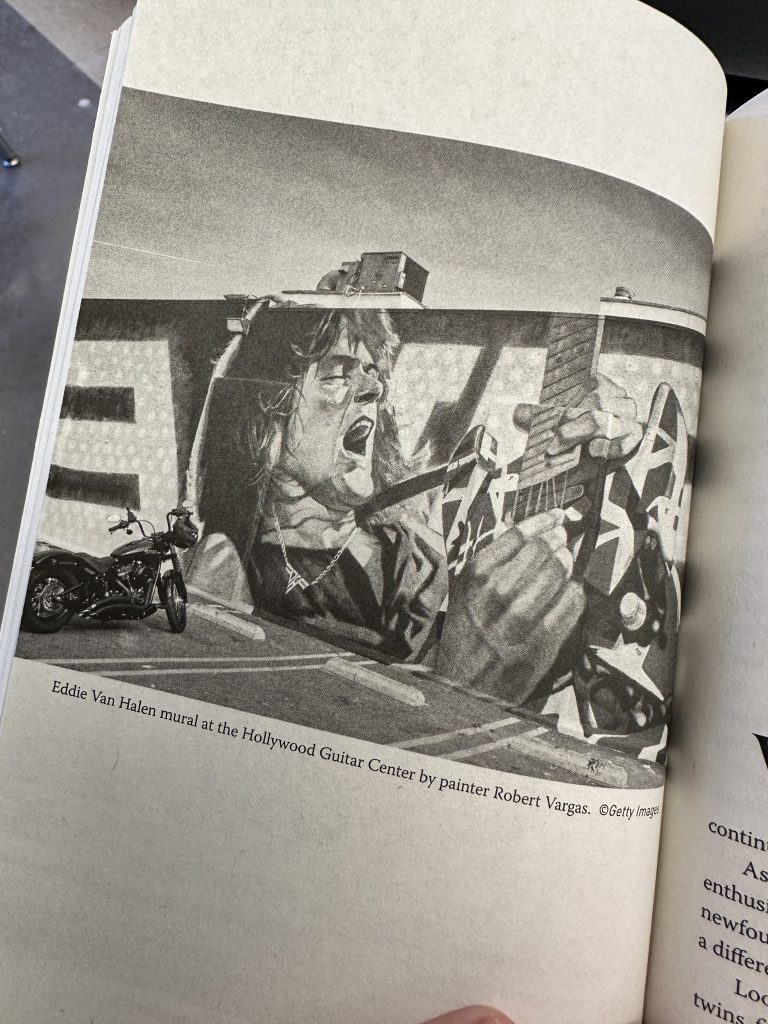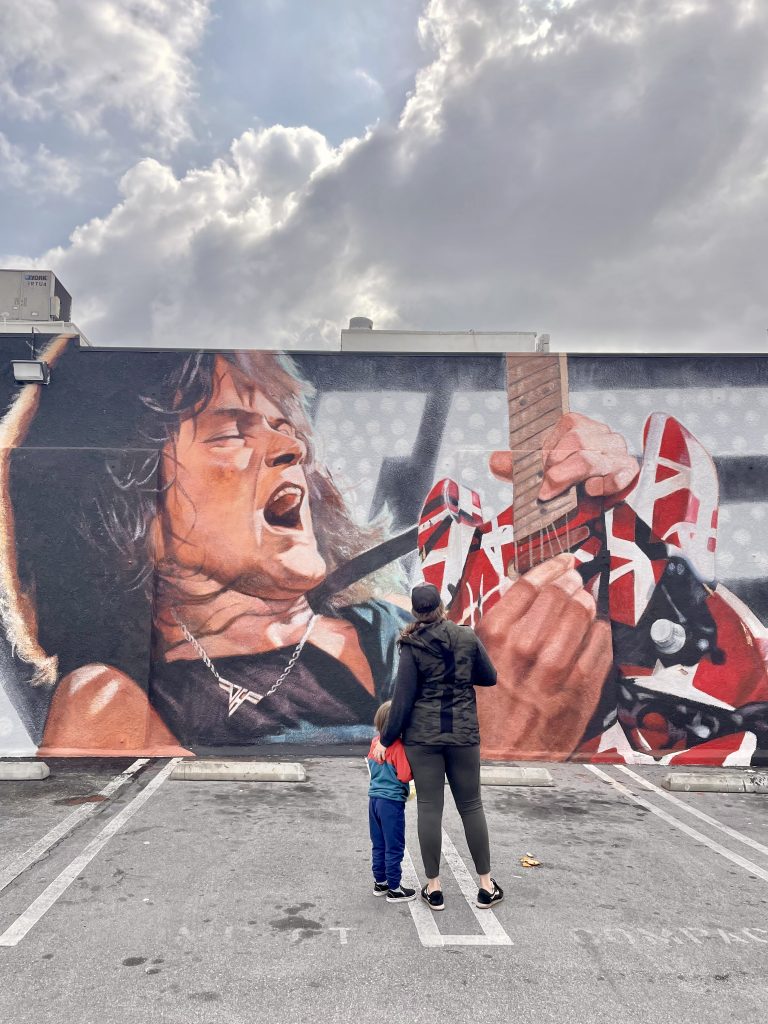 Obviously I’m a Van Halen fan – my son’s middle name is Halen – but there is always something more to learn about your favorite band which is why I decided to read Eruption: Conversations With Eddie Van Halen. Written by Brad Tolinksi and Chris Gill, this book is the first to be published after EVH’s death in October 2020.
Obviously I’m a Van Halen fan – my son’s middle name is Halen – but there is always something more to learn about your favorite band which is why I decided to read Eruption: Conversations With Eddie Van Halen. Written by Brad Tolinksi and Chris Gill, this book is the first to be published after EVH’s death in October 2020.
From the second page it’s clear that the authors are fans – nerds even – when it comes to Eddie Van Halen: “He singlehandedly changed the course of music for much of the eighties and nineties by reviving guitar-oriented music, whose primacy had been threatened by the synthesizers in New Wave and the sleek orchestrations of disco.” They also clarify how this book is different than those that came before – as their information is from hours and hours of interviews that delved into all sides of the virtuoso guitar player. All of that piqued my interest in terms of learning something new.
Eruption is my third Van Halen-related book (I’ve read Van Halen Rising: How A Southern California Backyard Party Band Saved Heavy Metal https://lauralieff.com/van-halen-rising/ and David Lee Roth’s Crazy From The Heat https://lauralieff.com/david-lee-roth-crazy-from-the-heat/) so I already knew about EVH’s immigration from Holland to Pasadena. What I didn’t know is that being bullied and ridiculed as a child because he couldn’t speak English laid the groundwork for a lifetime of insecurities which led to early drinking and the addictions and subsequent cancer that ended his life too soon. Reading that broke my heart.
While a lot of the Q&A portions of the book are interesting and fun to read, some of them delve too far into “guitar nerd” territory. For someone who doesn’t play an instrument, a lot of those conversations and that language were lost on me. That being said, the “musical interlude” sections in which different people involved in Van Halen over the decades talked about their experiences were interesting and exemplified that there are always many sides to every story.
A few notes:
I’m not sure why Warner Bros. decided to release “You Really Got Me” as the band’s first single in 1978. Why choose a cover song? And why so many covers over the years? Don’t get me wrong, I love their versions of “(Oh) Pretty Woman,” “You’re No Good,” “You Really Got Me,” etc. but it’s weird. EVH mentions that the covers were too much as well.
For some reason it still blows my mind that Van Halen’s first two album were released at the end of the seventies.
I love that EVH played guitar on “Beat It” – and how it ironically kept Van Halen’s 1984 out of the top spot on the charts. While 1984 peaked at number two, Thriller stayed at number one for three weeks and “Beat It” won Record of the Year at the 1984 Grammys.
After 1995, Van Halen only recorded two more studio albums over the next 20 years which was shocking considering they were one of the world’s biggest bands.
In chapter 10, when EVH starts talking about his son Wolfgang, his whole delivery and demeanor changes. He is the proudest of dads. His son was only 16 years old when he played on the Van Halen 2007-2008 tour and I remember watching their dynamic when I saw the band live. It was something else.
EVH’s last public performances were at the Hollywood Bowl on October 2 and 4, 2015. He passed away on October 6, 2020.
It’s hard to read the interview parts where he talks about beating cancer and other health issues and how he’s fighting to stay healthy.
Van Halen was inducted into the Rock and Roll Hall of Fame in 2007.
On the 2012 tour, Roth introduced the band as “Three parts original, one part inevitable.”
Quotes:
EVH: “Playing music is what saved our family.”
“‘Eruption.’ Just one minute and 42 seconds long, it forever changed the way electric players looked at their instrument.”
“Over the course of Van Halen’s thirty-five-minute run time, Ed redefined the rock guitar vernacular.”
“1984 was a monumental breakthrough for Van Halen the band and Van Halen the guitarist. The album contained the most consistent set of material since their debut and broke new sales records for the group.”
Steve Vai on EVH: “The thing I loved about Ed was his reckless perfection. That’s why his guitars looked so beautifully beat to shit.”
“1984 was a moment in time and combinations of many factors.”
Ray Danniels on EVH: “Eddie Van Halen was the Great American Guitar Hero. You have to go back to Jimi Hendrix to find anyone else at that level.”
EVH: “Music was the one thing that nobody could take away from me.”
Gary Cherone on David Lee Roth: “He influenced a generation…He was the Master of Ceremonies for an entire generation.”
EVH: “Music is not a competitive sport.”
EVH: “Van Halen has been aggressive since day one.” That’s true.
Wolfgang: “AC/DC is in all of our hears because they rule.”
“None have resonated with the masses the way Eddie did.”
Fun Facts:
Van Halen was the first band of the new wave of young groups to work their way through the local clubs onto a major label.
“Panama” resulted from the band asking Eddie to write “something with an AC/DC beat.” And “Drop Dead Legs” was inspired by “Back in Black.”

“Jump” was the only number one single Van Halen ever had.
The authors point out that “some of the best-selling rock albums of all time never made it to number one on the US charts” – i.e. AC/DC’s Back in Black and Led Zeppelin IV.
Not sure how fun this fact is, but it’s worth mentioning: Eddie named his studio 5150 because that is the police code for escaped mental patients.
Wolfgang came up with the arrangement for “Stay Frosty” which is my favorite song on A Different Kind of Truth.
Roth played the intro to “Ice Cream Man” – not EVH.
In 2011, Eddie was honored by the Smithsonian National Museum of American History for his contributions as an inventor, musical innovator, and immigrant.


Leave a Reply